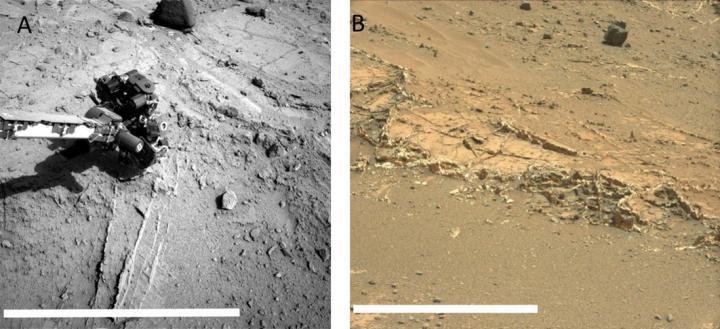Veins on the surface of Mars in the Yellowknife Bay part of the Gale Crater were once home to water "habitable" by Earth standards, though it likely did not taste good, researchers in England report after analyzing data on samples collected by the Mars rovers. Photo by University of Leicester and Open University
LEICESTER, England, Aug. 5 (UPI) -- Researchers in England believe veins on the surface of Mars were formed as lakes -- "habitable" by Earth standards -- evaporated, according to a new study.
Minerals common to groundwater on Earth, though at different levels, are thought to be evidence that water left sediments behind in Yellowknife Bay in Gale Crater on Mars, say researchers at the University of Leicester and The Open University in England.
While the researchers say the water would likely be disgusting to human tastes, its composition would allow for life, based at least partially on comparisons to rocks found in Watchet Bay in the North Devon coastal area of England.
"These result provide further evidence for the long and varied history of water in Gale Crater," Ashwin Vasavada, a scientist on the Curiousity Rover project at NASA's Jet Propulsion Laboratory, said in a press release. "Multiple generations of fluids, each with a unique chemistry, must have been present to account for what we find in the rock record today."
For the study, published in the journal Meteoritics and Planetary Science, researchers compared Gale Crater waters with fluids modeled for Martian meteorites, as well as with rocks analyzed by the Mars rovers and terrestrial ground and surface waters.
The researchers found sediments in the crater were high in sodium, potassium and silicon, low in magnesium, iron and aluminium and had a neutral to alkaline pH level.
The findings, researchers say, further illuminate the history of water on Mars, as well suggesting groundwater on Mars may have been "habitable by Earth standards."
"The taste of this Martian groundwater would be rather unpleasant, with about 20 times the content of sulphate and sodium than bottled mineral water for instance," said John Bridges, a professor in the department of physics and astronomy at the University of Leicester. "However as Dr. Schwenzer from The Open University concludes, some microbes on Earth do like sulphur and iron rich fluids, because they can use those two elements to gain energy. Therefore, for the question of habitability at Gale Crater the taste of the water is very exciting news."















